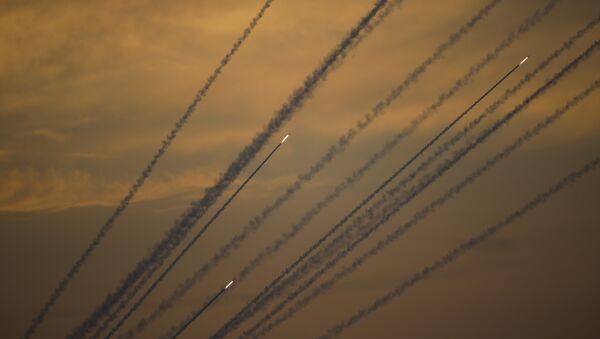After several weeks of relative quiet, three rockets emanating from the Gaza Strip were launched towards Israel's southern communities and although no damage has been reported, that was enough to ruin the evening of local residents, who were caught off guard by the strikes.
"As someone who has been born here, I know that 'quiet' is always relative, it is an illusion that always explodes," said Orr Bar-Ilan, a resident of Kfar Gaza, a collective community located just five kilometres east of the Strip.
End of Tranquility
This time around it exploded on Sunday evening when many families used the hot summer weather to splash in the swimming pool of Kfar Gaza.
"I suddenly heard the hysteria of children and their parents, who rushed out of water when they heard the sirens going off. Then when moods calmed down, it was an ordinary night for us, a night full of nightmares and fears, just as it has been the case in the past twenty years," she explained.
Over the past two decades, Israel has been facing a barrage of rockets emanating from Gaza. The first shelling occurred in 2001 and since then the number of rocket attacks has continued to climb and in 2019, a year that was not associated with any military operations in Gaza, Israel registered 1295 launches, many of which hit Israeli towns and cities.
The outbreak of the coronavirus in Israel, the Palestinian Authority and Gaza changed that equation, and there have been reports that Hamas didn't want to escalate tensions, preferring to work hand in hand with Israel, which not only supplied Gaza with medical equipment but also trained local doctors in a bid to contain the spread of the disease.
"For the residents of the south, the pandemic brought some sort of relief and I caught myself several times thinking that the outbreak has improved our lives because at least our kids didn't have to face the reality of living under constant indiscriminate fire," confided Bar Ilan.
No End in Sight?
Now that the attacks have resumed but the pandemic hasn't disappeared, residents of the south will need to get used to a new reality, where they will have to do both: run to a bomb shelter and keep a two meters' distance apart from one another.
On Sunday, when the news of the rockets started coming in, Israel's home front command released a number of instructions urging people to maintain social distancing, wash their hands and keep their facial masks on even when they run to the bomb shelter.
The only problem is, believes Bar Ilan, it is virtually impractical. "Many elderly people will now need to think twice about whether to run to a shelter and risk contacting COVID-19 or remain in their houses and pray that a rocket will not reach their homes," she complained adding that the government didn't do enough to change that trend.
"In the past year and a half, the government has been preoccupied with inner political battles and three rounds of election campaigns that took too much of its energy. Then it was [US President Donald] Trump's peace plan that stole most of the spotlight. The concerns of the country's south were not on the parliamentarians' agenda," said Bar Ilan.
The raging pandemic and attempts to keep the economy afloat have since taken up much of the government's attention.
The result is, says Bar Ilan, is zero deterrence. "When the country is bombarded with three rockets and our 'reaction' is restricted to bombing several sand dunes in the Gaza Strip, it sends a message and leaves an aftertaste that what we did wasn't enough," she said referring to the IDF which attacked Hamas military targets on Sunday night following their launch of rockets.
"I don't want a war, but when the security of my country is being challenged, our reaction should be strong to the extent to make the other side think twice on whether their attack was actually worth it. That's how a country should act to protect its citizens. Unfortunately, in our case, it wasn't the case," she summed up.




